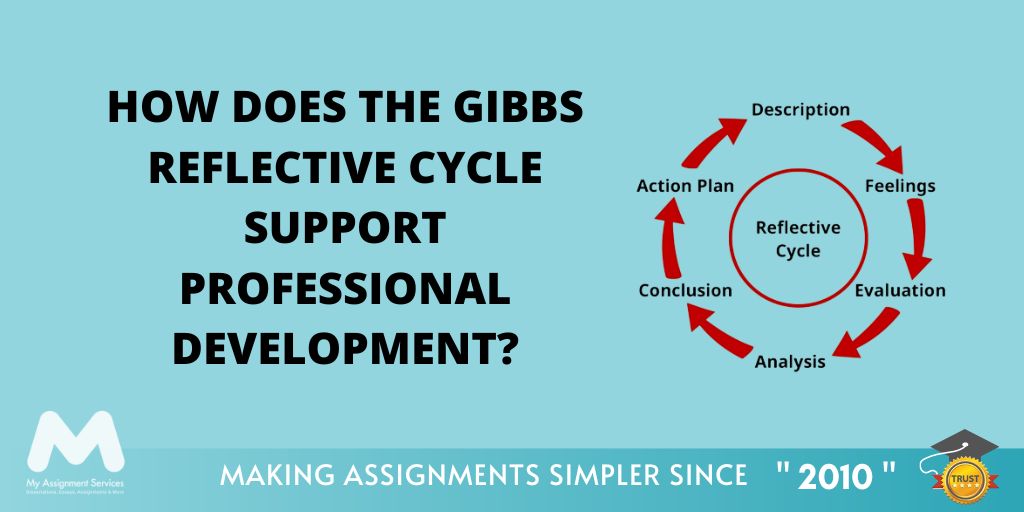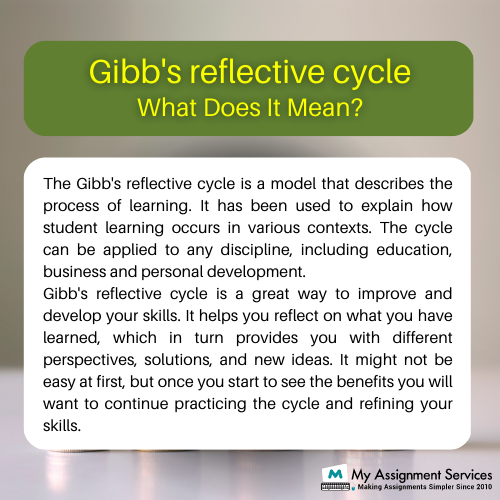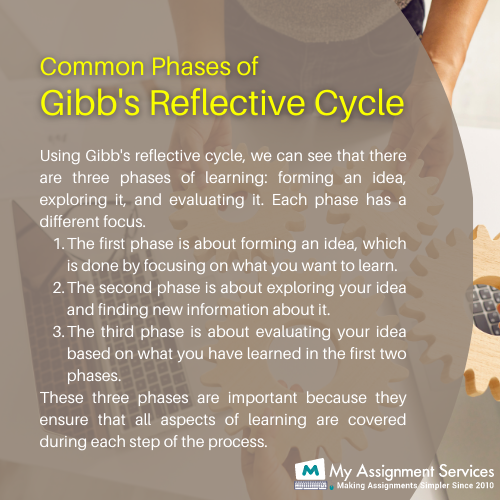
In business and life, you need to learn to grow, gain skills, and evolve constantly; otherwise, you will stay caught up. Gibb's reflective cycle supports the professional development of individuals at all levels of their careers by allowing them to reflect on their current position, identify where they should develop and enhance skills and abilities, and discuss how they can be supported in these areas.
In a business world that can often lead to fast-paced and stressful situations, it's essential to have tools and strategies that encourage reflective thinking. Gibbs Reflective Cycle is one of these tools.
Gibbs's reflective cycle supports a systematic approach to reflection that has been used with groups throughout the years. Gibbs's reflective cycle is a powerful tool in the development of professionals. It changes the input and outcome of an individual's experience by creating a 360-degree reflection on their performance and ability to take further action.

Gibb's reflective cycle supports a model of learning by trial and error. It was developed by Dr. Sir Trevor W. McLeod in the mid-1960s and later expanded upon by his students at Harvard University. The model is most commonly used to explain how humans learn from their mistakes, but it can also explain how animals learn from their mistakes.
This model is based on the idea that learning involves three steps:
In 2003, Robin M Gibb and David A. Day also proposed Gibbs reflective cycle to explain the process of visual attention. The model proposes that there are three stages in the process:
Encoding is the stage at which the brain processes incoming information. In this stage, sensory information is encoded into neural representations that can be easily accessed later. For example, an image of a house may be encoded as a collection of features arranged in a particular order. Once this has been done, it becomes easier for us to remember information about houses than other things (such as faces).
Maintenance refers to keeping track of what information has already been processed and stored in memory (e.g., by inhibiting irrelevant signals from reaching conscious awareness). For example, if you are trying to remember where someone lives so that you can tell them when they call, your brain will suppress signals from their face or body that might cause you to forget their address.
Inhibition is the stage at which we decide what to pay attention to and what not to pay attention to. This process involves using prior experience and knowledge about relevant areas of our lives (such as where people live) to help us decide whether something we see is essential. For example, if someone in front of you suddenly turns around, your brain will automatically suppress any signals from them so that you can focus on their face instead.
The Gibbs reflective cycle supports a series of self-evaluations within the context of a work situation. The cycle involves four steps:
There are two main ways to use Gibbs reflective cycle:
Gibb's reflective cycle supports decision-making that can help us make more informed decisions in situations with many variables and factors at play. It is based on the idea that people tend to make decisions based on their values and beliefs but then later reflect on those decisions.
The cycle begins with an initial choice or course of action, followed by consideration of alternatives and information gathering. Finally, we make a decision based on our assessment of these factors, which often leads us back to thinking about our options again.
This cycle can be useful for helping you to consider different approaches or options before making a final decision. As you think through the various possibilities, it will be easier to see what benefits each could bring you and how they stack up against each other.
Gibbs Reflective Cycle supports Professional Development, a core element of organizational change. Individuals must acquire the knowledge and skills necessary to sustain or advance their careers. Gibbs Reflective Cycle supports professional development by allowing participants to reflect on their experiences and identify ways to improve them.
The reflective cycle also allows participants to discuss how they can best contribute to the organization, improve communication, and enhance workplace relationships. The reflective cycle enables participants to:
Gibbs Reflective Cycle is a way of systematically learning from the best professionals in your field. It can help you improve your professional development by:

In Gibb's Reflective Cycle, we learn and practice to improve our skills. This can be as simple as reviewing a lesson we recently learned or as complicated as learning how to do a new task on the job. The key is that we are actively engaged in improving our ability to solve problems and perform tasks.
The benefits of this approach include the following:
In addition to these psychological benefits, there are also physical benefits associated with professional development (PD):
In essence, the reflective cycle is the process by which we change our thoughts and behaviors to improve ourselves. It's a process we all can learn and use, whether at work or home, throughout our lives. It may be one of the most important skills we can develop in life and academia. Hopefully, this blog gave you enough information and cleared your doubts. For more information, contact My Assignment Services now!

Rick is a report writing professional who began with guest lectures at the The University of Manchester in 2010. With his passion for learning and reading, he received the best researcher of the year award in 2015. He is committed to boosting student success inside and outside the educational institutions. Rick joined My Assignment Services in 2014 and is now leading two of the company’s major projects.
1,212,718Orders
4.9/5Rating
5,063Experts
Turnitin Report
$10.00Proofreading and Editing
$9.00Per PageConsultation with Expert
$35.00Per HourLive Session 1-on-1
$40.00Per 30 min.Quality Check
$25.00Total
FreeGet
500 Words Free
on your assignment today
Trending now
The Student Corner
Subscribe to get updates, offers and assignment tips right in your inbox.
Popular Posts
Popular Posts
Request Callback
Doing your Assignment with our resources is simple, take Expert assistance to ensure HD Grades. Here you Go....
Speak directly with a qualified subject expert.
Get clarity on your assignment, structure, and next steps.
In this free session, you can:
Loved reading this Blog? Share your valuable thoughts in the comment section.
Add comment